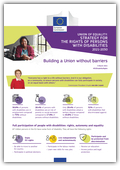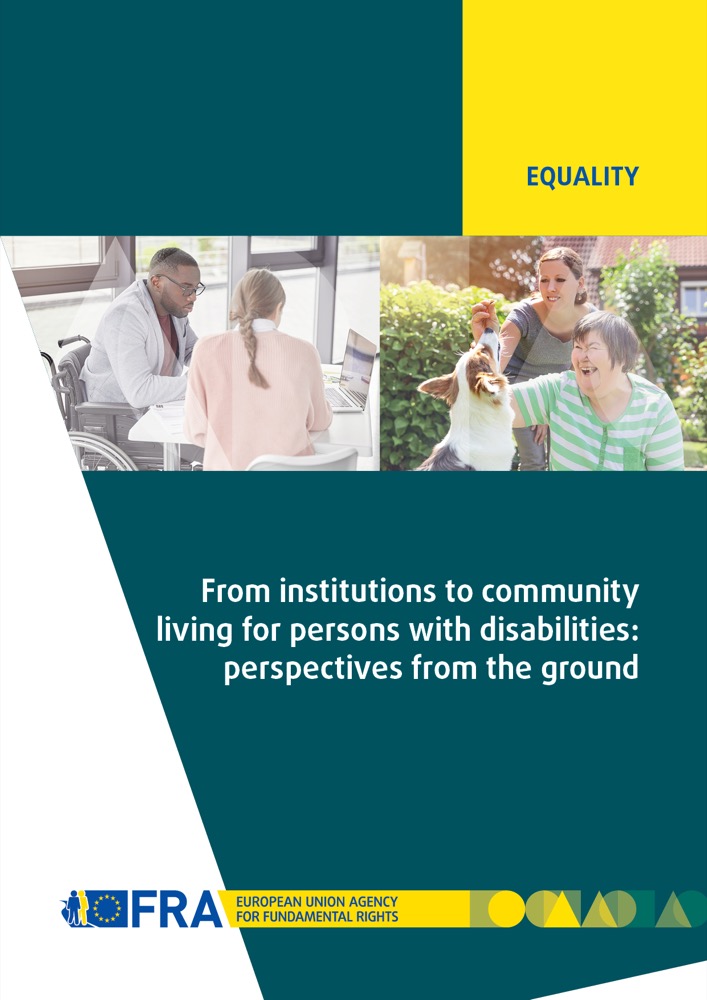Spotlight on the rights of people with disabilities
Striving for equality, as the paramount democratic value, is a declared priority of the European Union. An important step towards a more fair and inclusive Europe came on 3 March 2021 with the presentation of the new strategy for the rights of persons with disabilities 2021-2030 by the Commission. This builds on the previous European disability strategy 2010-2020 and aims to create conditions for everyone to have the potential to thrive in the EU, regardless of their disability.
The importance of action has been highlighted by the global public health crisis, which has laid bare the fact that, despite previous efforts, people with disabilities still face obstacles in access to education, employment, participation in political life and even healthcare. Due to these and other obstacles, people with disabilities have been among those hit hardest by the COVID-19 pandemic.
The strategy for the upcoming 10 years sets out key initiatives around three main topics including: free movement in the EU regardless of support needs; independent living and autonomy; and non-discrimination and equal opportunities. These new initiatives are supported by the EU legal framework fostering accessibility in both physical and virtual environments (such as the European Accessibility Act and the web accessibility directive).
The March edition of our newsletter highlights publications related to the rights of people with disabilities along with publications on several other interesting topics.
|

|
PDF |
|
Strategy for the rights of persons with disabilities 2021-2030
|
This publication presents the new and strengthened strategy for the rights of persons with disabilities 2021-2030, aimed at achieving further progress in ensuring the full participation of such people. The strategy will guide the action of Member States, as well as EU institutions, building on the achievements of the past 10 years and offering solutions to the challenges ahead. |
Available in English |

|
PDF |
|
Strategy for the rights of persons with disabilities 2021-2030 |
This factsheet summarises the key points of the new strategy for the rights of persons with disabilities 2021-2030. |
Available in English, French and German |

|
PDF |
|
|
This study analyses the previous European disability strategy (2010-2020), reflecting on its design and implementation, as well as its achievements and shortcomings. Based on this analysis, it makes recommendations regarding the new European disability strategy post-2020. |
Available in English
|
More on this topic |
 |
PDF/Paper |
|
Perspectives from the ground |
The Convention on the Rights of Persons with Disabilities commits the EU and its Member States to protect the right of persons with disabilities to live independently in the community – which implies moving them out of institutional settings whenever possible. But much remains to be done to make this a reality in practice. This report presents the main insights gained during fieldwork on the drivers of and barriers to deinstitutionalisation. |
Available in English |

|
PDF/Paper |
|
|
This policy brief examines the social situation of people of working age with disabilities, using data from the 2011 and 2016 rounds of the European Quality of Life Survey. It looks at changes over this period in employment, education and training, participation in society, social protection and healthcare, all priority areas of the European disability strategy. |
Available in English, French, German and Spanish |

|
DATASET |
|
|
ESSPROS (European System of integrated Social Protection Statistics) is a common framework which enables international comparison of the administrative national data on social protection. This dataset provides a coherent comparison of social benefits to households among European countries and their financing. The data is classified by function of social protection (including disability).
|
|
Also out recently
 |
PDF |
|
General report on the activities of the European Union |
2020 was a very special year for all humanity. Do you want to know what the EU did during the year to combat the pandemic and its effect but also what progress it made in delivering on its other priorities? The measures it took to boost jobs, growth and investment? Or how citizens benefited from the European Union? You can find the answers to all these questions and more in The EU in 2020. |
Available in all the official languages of the EU |

|
PDF/Paper |
|
Geopolitical implications for Europe |
In the face of the economic and societal changes brought by COVID-19, along with the structural fragilities that it has exposed, some argue that that the pandemic will merely accentuate pre-existing trends and dynamics, while others believe that the crisis will create a world profoundly different than before. This paper examines both dimensions. |
Available in English |

|
PDF |
|
2020 edition |
This annual publication provides an economic description of the whole European fisheries and aquaculture industry. It replies to questions such as what is produced/exported/imported, when and where, what is consumed, by whom and what are the main trends. A comparative analysis enables the performance of fishery and aquaculture products in the EU market to be assessed in comparison with other food products. |
Available in English, French, German, Italian and Spanish |
Research and innovation |

|
Podcast |
|
|
The Community Research and Development Information Service (CORDIS) is proud to announce the launch of CORDIScovery, its new monthly podcast that dives into some of the key scientific solutions being developed by EU-funded researchers to address the major societal challenges that we all face today. |
Read the rest of the article in English, French, German, Italian, Polish and Spanish on the CORDIS website where you can also find the 1st CORDIScovery podcast about biodiversity
|

|
PDF |
|
A conceptual model |
In recent years, the topic of hybrid threats has dominated the security landscape in Europe. Although several stakeholders consider it to be a new topic, in fact it is not. It is as old as conflict and warfare, but repackaged and empowered by changing security environment dynamics, new tools, concepts and technologies targeting vulnerabilities in several domains in an unprecedented manner. Addressing it effectively requires a common understanding of the hybrid threat activity, the identification of gaps in prevention, preparedness and response, and the development of the right actions. This is the aim of this publication. |
Available in English |
You may also like |
 |
PDF |
|
HERA incubator |
The EU must be prepared to tackle new variants of the novel coronavirus and to rapidly develop and produce on a large scale vaccines effective against those variants. This is why the European Commission is launching the HERA incubator explained in this factsheet. |
Available in all the official languages of the EU |
 |
PDF |
|
An overview |
There has been increasing recognition and evidence that teaching about the cognitive, emotional, social and physical aspects of sexuality can have positive impacts on children and young people’s sexual and reproductive health. However, as education remains a Member State competence, there are considerable differences in its content, delivery and organisation between Member States. This publication examines the situation. |
Available in English |

|
PDF/Paper |
|
European and Vietnamese food |
Have you ever thought of cooking European ingredients in a Vietnamese way? This book will help you to bring new life to your plate, perfectly combine European and Vietnamese ingredients! It is not by chance that we can easily come up with all these perfect matches. Vietnam’s gastronomy already blends many European products and flavours. |
Available in English and Vietnamese |
Our news |
| |
Shaping our digital future with the EU Open Data Days 2021
The first edition of the EU Open Data Days has been launched to bring the benefits of open data to the EU public sector, and through it to people and businesses. The event will take place online from 23 to 25 November 2021. It will comprise EU DataViz 2021, a conference on open data and data visualisation, on 23 and 24 November, followed by the finale of the annual open data competition, EU Datathon 2021, on 25 November. Both parts of the event are now open for submissions. For more information, follow the EU Open Data Days website and @EU_opendata on Twitter.
|
Digital publishing made accessible
The EU has taken important steps towards building an inclusive society and the Publications Office of the European Union has an important role in the field, providing EU institutions, agencies and bodies with services and knowledge to create accessible content. This information is free for citizens, professionals and businesses too. Discover the OP´s microsite dedicated to the subject, featuring essential information and an e-learning module on accessibility. Start creating documents that are accessible by the part of your potential audience with physical impairments: https://op.europa.eu/web/accessibility
|
|
|
